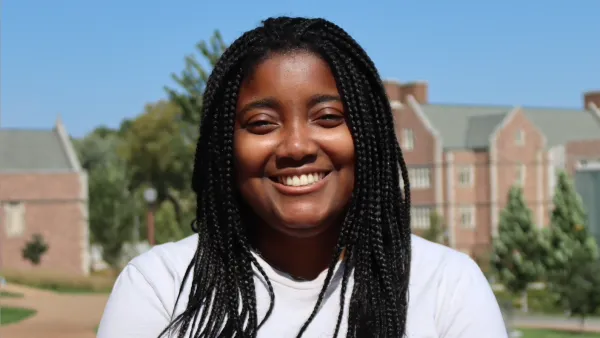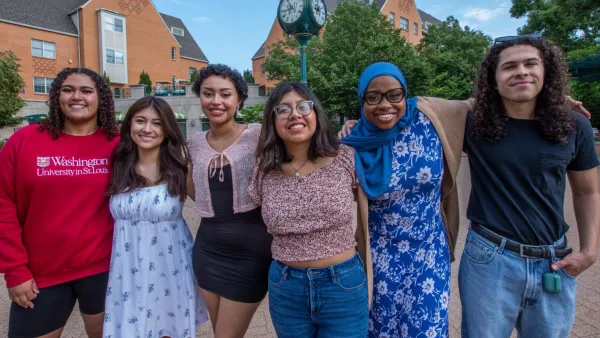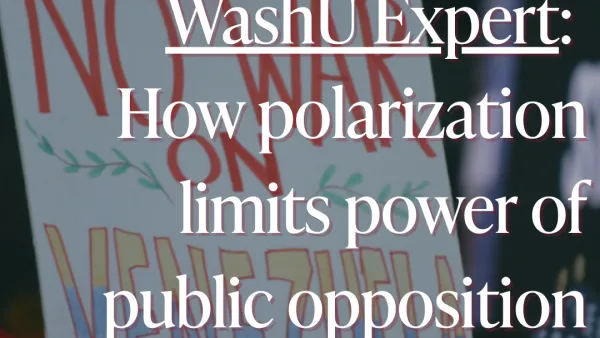Undergraduate student, Helen Webley-Brown wins Harriet K. Switzer Leadership Award. The award was created to recognize outstanding graduating senior women who have made a significant contribution to Washington University in St. Louis during their undergraduate years and have demonstrated exceptional potential for future leadership.
The Harriet K. Switzer Leadership Award is awarded to students who show exceptional leadership. What are some examples of the leadership opportunities you've had during your time at WashU?
During my first semester at WashU, I was elected President of William Greenleaf-Eliot (WGE) Residential College Council. In this role, I co-led weekly meetings and managed a team of 8 people to plan and run events for the second-largest residential college on campus. One of our main successes was the creation of a weekly Self-Care Sunday series, which invited WGE residents to take a break from studying and enjoy a free snack and activity. During my sophomore year, I remained on the WGE College Council, but as a general member.
I founded the WashU chapter of European Horizons during my sophomore year to provide a space for European international students to meet with each other, as well as to host events for non-European WashU students to learn more about the culture and politics of different European countries.
I co-founded WashU Pre-Law Society in Sept ‘21. WashU’s first “no dues, no cuts” legal interest club, it is aimed at improving accessibility to pre-law resources on-campus. I’m not very involved anymore as I decided to go down the PhD route, but the current leadership team is incredible and the club is doing well.
As a Civic Scholar, I founded a website called Legal Lark, which provides information about the US juvenile justice system, as well as a list of resources for those in need of juvenile justice related services. To build this website, I acted as project manager, hiring and leading three other WashU students to perform website development, UI design, and writing tasks.
My junior spring (Jan to May ‘21), I served as a TA for QPM. I led weekly office hours to field questions on research methodologies and troubleshoot R code
Another important part of the award is acts of service to others. What activities have you participated in demonstrating your service to others?
From Sept ‘19 to May ’20, I served on the Undergraduate Experience Committee to the Board of Trustees. As an undergraduate member, I represented undergraduate interests during meetings, advocating for improved mental health services and financial aid resources.
I am also currently a member of the Undergraduate Student Affairs Advisory Board, through which I regularly meet with senior student affairs staff and other undergraduates to provide feedback on campus policies and advocate for improved resources for low income and/or international students.
During my junior spring (Jan ‘21 to May ‘21), I was the service chair of Phi Delta Phi (PDP), a pre-law honorary society on-campus.
During my junior year of high school, I was accepted into a college prep programme run by the US-UK Fulbright Commission called the Sutton Trust US Programme. Its mission is to help state school educated students from the UK apply to US universities. After I got accepted into WashU, I wanted to give back to the programme so I served as a team leader for two years and then as an application mentor for two years. Through these positions, I have given feedback on college essays and provided advice on applying to college to around 40 low-income, mostly first-gen British high schoolers.
Has receiving this award changed your future plans? What are you planning on doing after graduation?
After graduation, I will be beginning my PhD in Political Science at MIT. My long-term goal is to become a professor. As a professor, I would hope to serve others by mentoring students and producing community-engaged research.
How has your major in Political Science fit into your leadership and service experiences?
My Political Science major helped push me to critically think about questions like: who gets to participate in political processes, who and what prevents political participation, and how can we improve it? Because these sorts of questions centre on issues of power and representation, I think they can help inform leadership and service. For example, when Ranen Miao approached me about starting a new pre-law club (WUPLS) on-campus, I was motivated by the idea that taking on this initial leadership role would help democratise access to pre-law resources on campus. Before WUPLS, there was only one undergrad, pre-law club (which I am also a member of), but you previously had to pay dues and go through a competitive application process which created artificial barriers to really useful resources and like-minded peers. In my mind, it was a college-level problem of power and representation that we could help tackle. I’m not very involved in WUPLS anymore as I decided to go down the PhD route, but the current leadership team is incredible and the club is doing well.
I’ve also been fortunate to get political science credit for a few internships that I’ve done during my time at WashU. Most of these internships were unpaid as I was working for nonprofits, so getting credit enabled me to work with organizations, like the Human Rights Campaign and the Surveillance Technology Oversight Project, that do service-led work that I am passionate about.
Do you have anything else you'd like to share?
Not sure how relevant this is but being a Danforth Scholar and a Civic Scholar have also influenced my decision to participate in leadership and service opportunities at WashU. I also just got Phi Beta Kappa!




